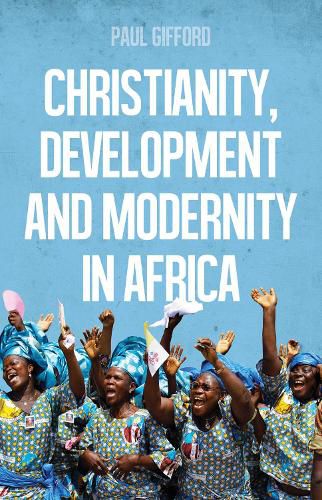Readings Newsletter
Become a Readings Member to make your shopping experience even easier.
Sign in or sign up for free!
You’re not far away from qualifying for FREE standard shipping within Australia
You’ve qualified for FREE standard shipping within Australia
The cart is loading…






Is African Christianity a religious marketplace now dominated by only two big players, the Catholic Church and Pentecostals? There is an important if largely unremarked diversity within African Christianity; on the one hand, an enchanted Christianity that views the world as pervaded by spiritual forces, and on the other a disenchanted Christianity that discounts them. An enchanted Christian sees his glorious destiny threatened by witches, spirits, and ancestral curses. Churches catering for this worldview lay bare the workings of this spirit world, and this enchanted imagination, along with the prosperity gospel, and emphasis on the pastor’s ‘anointing’, are the principal characteristics of much African Pentecostalism. Gifford argues that the enchanted religious imagination militates against development by encouraging fear and distrust, diminishing human responsibility and agency, and downplaying functional rationality. The prosperity gospel of ‘covenant wealth from tithes and offerings’ is the antithesis of Weber’s Protestant ethic; and to magnify the person of the pastor is to perpetuate the curse of the ‘Big Man’.Official Catholicism, totally disenchanted and long associated with schools and hospitals, is now involved in development, from microfinance to election monitoring, from conflict resolution to human rights. This ‘NGO-ization of Catholicism’, made almost inevitable by funding from secular donors like the EU and UN, even if defended theologically, comes at the price of failing to address the ‘religious’ needs of so many African Christians.
$9.00 standard shipping within Australia
FREE standard shipping within Australia for orders over $100.00
Express & International shipping calculated at checkout
Is African Christianity a religious marketplace now dominated by only two big players, the Catholic Church and Pentecostals? There is an important if largely unremarked diversity within African Christianity; on the one hand, an enchanted Christianity that views the world as pervaded by spiritual forces, and on the other a disenchanted Christianity that discounts them. An enchanted Christian sees his glorious destiny threatened by witches, spirits, and ancestral curses. Churches catering for this worldview lay bare the workings of this spirit world, and this enchanted imagination, along with the prosperity gospel, and emphasis on the pastor’s ‘anointing’, are the principal characteristics of much African Pentecostalism. Gifford argues that the enchanted religious imagination militates against development by encouraging fear and distrust, diminishing human responsibility and agency, and downplaying functional rationality. The prosperity gospel of ‘covenant wealth from tithes and offerings’ is the antithesis of Weber’s Protestant ethic; and to magnify the person of the pastor is to perpetuate the curse of the ‘Big Man’.Official Catholicism, totally disenchanted and long associated with schools and hospitals, is now involved in development, from microfinance to election monitoring, from conflict resolution to human rights. This ‘NGO-ization of Catholicism’, made almost inevitable by funding from secular donors like the EU and UN, even if defended theologically, comes at the price of failing to address the ‘religious’ needs of so many African Christians.